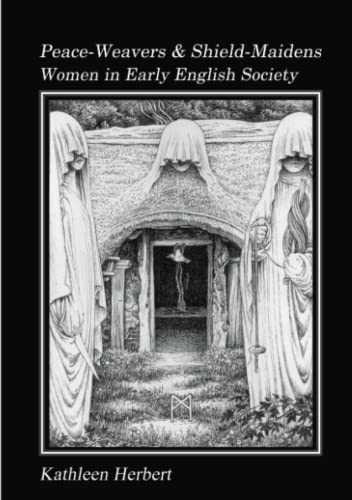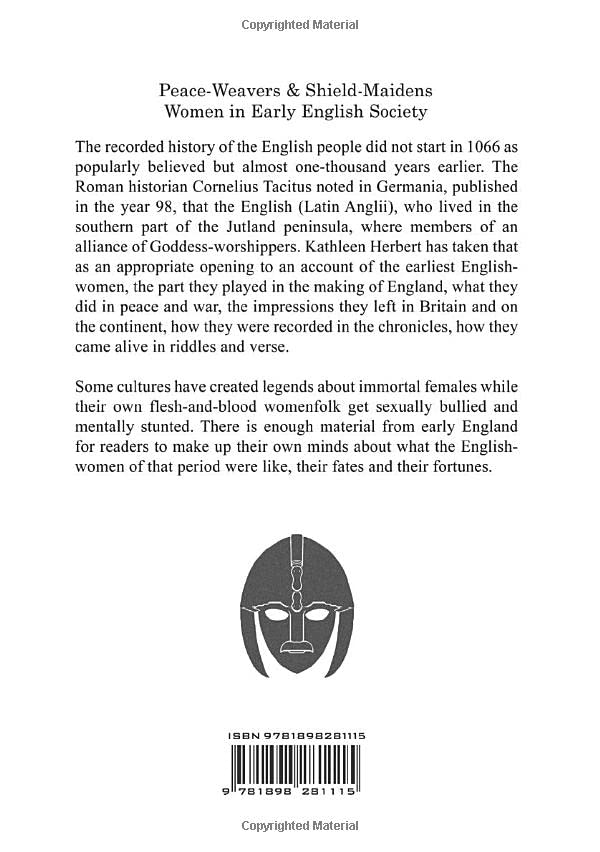Customer Services



Peace-Weavers and Shield-Maidens: Women in Early English Society
K**E
Very small book but lots of meat on the pages.
This book has quite a bit of information on influential women in Anglo-Saxon England (focusing just on the Saxon period prior to the invasion of William the Conqueror in 1066). Much of the information is presented in examples of women and their rise to power. Most of the women given in the book are peace-weavers, their influence was not spread (to our knowledge) with an axe or sword in their hand. There are good examples of shield maidens (literally women warriors who in this book are LEADERS) here but I would look more to Germanic/Scandanavian sources for more examples of sheild maidens. I think that the beginning of the book could have more meat for discussing early English society, women's role in society and how it "came to be". There are a few examples how the early English were similar to the non-Christian Germans (many peace-weaving women were nuns or other nobles supporting the church) but the book doesn't go into the "why" enough- both societies produced shield maidens and peace-weavers, both societies were similar but the origins of both types of women weren't fully expanded on in my view. Like I said earlier, the book is very short, I want to say under 70 or 80 pages- it took me less than an hour to read. Good source materials for further research but not THE definitive book on women in early English society.
C**S
Short, but worth reading
This is a very short work studyin the role women played in Anglo-Saxon society. I think the work is mostly solid (with caveats, see below), and provides a unique look at gender roles in Anglo-Saxon society.In a work this short, one does not expect to find the authoritative study on the subject. I would have liked to see a longer work here. Additionally, a survey of important women in society does very little to show more general trends. For example, Joan of Arc's campaign shows very little about women in medieval French society by itself. I couldn't help feeling that Herbert was glossing over more difficult points.All in all, I would recommend reading this book among many others. I would not recommend it as the only book on the subject, however.
T**R
Very good little book on the subject
Well researched booklet on an often overlooked topic in history. There is a lot of information packed into a very short book. Well worth your time if you are interested in Anglo-Saxon history.
S**J
An excellent over view and starting point
A great quick read with a ton of info on early Anglo Saxon and Germanic goings on of noble women and there associated people. A must for women who are pagan or heathen . You truly feel connected to the past and how these women lived and kept hte piece or instigated lack there of
J**Y
Interesting but rather small book
small book, interesting info. Along with "Lady with a Mead Cup", a nice addition to my Anglo-Saxon library. IMHO she could have added more info and documentation.
H**R
Very useful book
I am pleased with the clear writing, scholarly precision, and brevity of this book. These three qualities are so seldom found together. I am an avid amateur of history, and this is a very interesting light on this period. (I loved the "good press" for Aethelfled.)She has found some great sources - I'm already looking up some of the references.
G**T
Shield me from a bad review.
All you ever hear about is the male warriors, now something to show that women of that time did more than cook and breed.
K**S
Five Stars
new info
M**S
Engaging and scholarly: a rare mix!
I read this in an afternoon and found it to be full of excellent case studies and well argued cases. There are footnotes and references throughout, as you would expect from an academic paper, but the tone and the flow of the text is engaging and the author's opinions are well expressed. The sample is rather selective and all of the women selected are positive role-models and are not necessarily exemplars of the two archetypes she has chosen to focus on.I think a critique of the women in Anglo-Saxon literature might have been instructive; comparing historical examples to the models of the archetypes of the Good Queen and the Bad Queen, which are equally male viewpoints on what a woman should and should not do. The women whose lives she chronicles would then be seen against the light of expectation.I would also like to think that a discussion of Women in Early English Society would also have covered what is shown from archaeology - how significant are the rare finds of female burials with partly male grave-goods? If this paper was presented together with a critique of the archaeological record on the same topic, it would have a good deal more value, especially if the two were followed by a strong conclusion of how the two different sources of evidence support / contrast each other.I did very much enjoy the introduction which looked at the terminology for men and women in Old English; that the word "man" was not specifically male and that the English had a range of other words to use if distinction was required. To some extent English still uses this broad sense of the word man, especially in religion: I am sure none of the women who make up the majority of the congregation at my church feel that they are being excluded when the Creed says "for us men and for our salvation, He came down from heaven." Yet we get hung up on the word chairman!
G**N
Fascinating little book
Easy to read in a few hours or a single sitting, but a mine of useful information about women in Anglo Saxon society, with some unexpected gems- like the origins of the word hloefdige- which was later used to refer to an extraordinary woman- Ethelflead 'Lady of the Mercians', She gets a lot of attention (well six or seven pages in a book this length does count as rather a lot). A worthwhile read about the role, rights and expectations of women in a fascinating period.
D**R
Must-read work for all interested in the Anglo-Saxon period
This is a short book, but do not let that put you off buying this. I read this in one sitting, and learned more from this extremely profound yet concise work than from a lot of other, larger, more general books focusing on the period. Full of examples, particularly highlighting the life and deeds of Aethelflaed of Mercia, I heartily recommend it as part of any English historian's library.
M**Y
I really enjoyed this. I have been researching Aethelflaed for various ...
I really enjoyed this. I have been researching Aethelflaed for various Community Art projects that I have done over the last four years and finding written information on the women of the time is difficult. As I am not a historian, I appreciate writing which is not overly 'academic'and this little book provided some fascinating insights for me to draw on.
H**Y
I liked it.
For anyone interested in the subject of women in early English society this is a good read. I would recommend it, but not just as a bit of light reading, although it is quite thin I found it took me several attempts to finish the book as the style of writing wasn't the easiest to follow.
Trustpilot
2 weeks ago
2 months ago